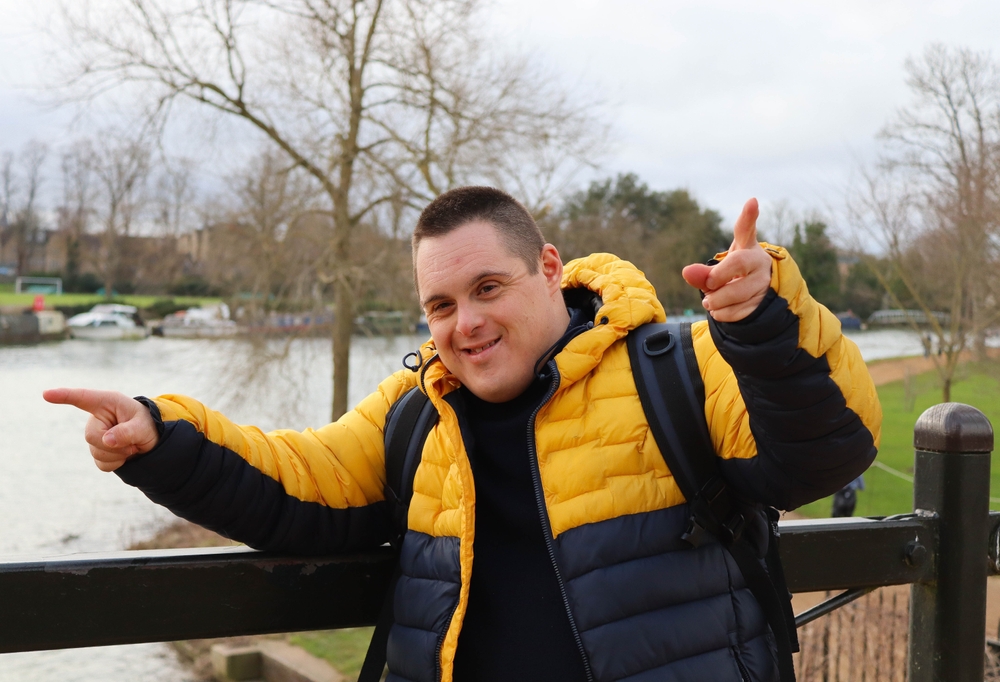Make an Appointment
Why is early intervention important for speech and language?
As a parent, you may find yourself concerned about your child’s development when the time comes for reaching major milestones.
All kids develop on their own timelines. While your oldest child began speaking at 12 months, your youngest may still be taking their time to start talking at 18 months.
If your child’s delay is cause for concern, early intervention is important for speech and language. With the help of a professional speech pathologist, your child can begin learning exercises and developing the tools to successfully begin speaking.
Here, we’re exploring early intervention and why it’s particularly important for speech and language issues. Let’s begin.
What is early intervention?
Early intervention often includes an entire team dedicated to your child’s development. This can include audiologists and speech-language pathologists. Your child’s early intervention team will assess their development and create plans to help your entire family start seeing results.
There are five key areas of developmental milestones for babies and toddlers:
- Physical skills: growth, movement and motor functions
- Cognitive skills: thinking and learning to problem-solving through structured play
- Communication skills: talking, nonverbal gestures and facial expressions, but also listening, understanding and showing an interest in what others are saying or doing before them
- Self-help skills: activities that a child learns to do on their own, like eating and getting dressed
- Social-Emotional Skills: playing, connecting and interacting with others and self-regulating their emotions
Early intervention speech therapy can only help your child’s development, so why wait? The earlier intervention begins, the better the outcome.
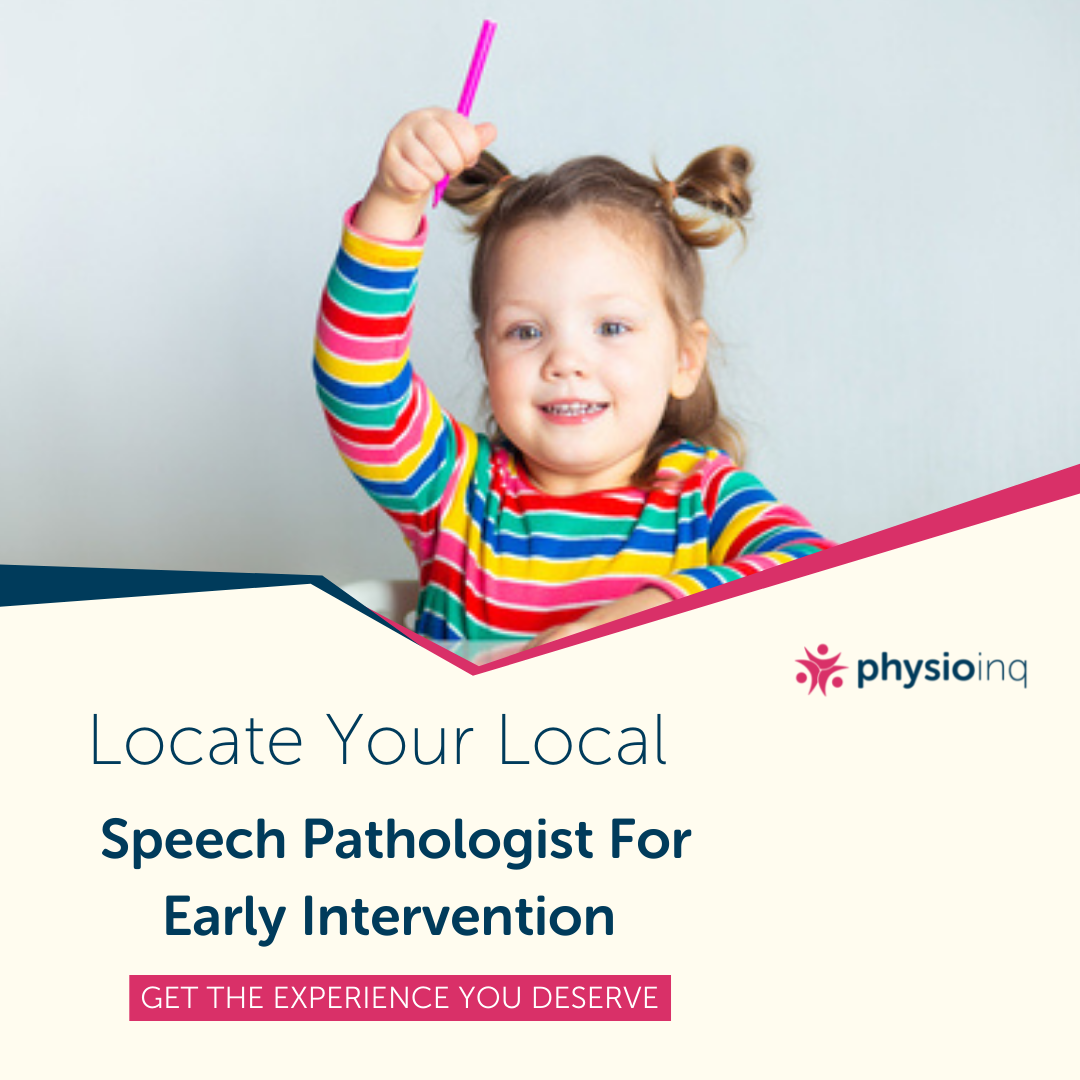
What is early intervention in speech pathology?
According to the CDC, early intervention is “the term used to describe the services and supports that are available to babies and young children with developmental delays and disabilities and their families.”
Early intervention speech therapy services are for speech and language developmental delays in children as soon as birth and most often under the age of 3.
In terms of speech and language, developmental milestones can range broadly. It is important to look for developmental milestones within a period of time to account for your child’s unique growth.
Rather than expecting your child to say their first word at 9 months old, it is smarter (and less anxiety-inducing) to anticipate this milestone within a range of 6-11 months.
It is when your child is not reaching speech-language milestones within expected ranges that you may seek early intervention in speech therapy.
Early intervention speech therapy goals seek to catch your child up to these milestones as much as possible.
Stanford Children’s Health outlines ranges for speech-language milestones as:
1) 0-5 months:
- Coos and giggles
- Vocalizes to express pleasure or displeasure
2) 6-11 months:
- Says their first word
- Tries to mimic sounds
- Tries to communicate by gesture
3) 12-17 months:
- Has 2-3 words to label people or objects
- Answers basic questions nonverbally
- Has a vocabulary of 4-6 words
4) 18-23 months:
- Asks for common foods by name
- Begins making animal sounds
- Begins to use pronouns
- Has a vocabulary of up to 50 words
5) 2-3 years:
- Can answer basic questions verbally
- Understands descriptions like “big” or “happy”
- Knows some spatially descriptive words like “on” or “in”
- Begins to use plurals and past tense
6) 3-4 years:
- Can group like objects together
- Can identify colours
- Uses more consonants and speech is more understandable to strangers
- Understands the use of objects
- Expresses ideas and feelings
- Repeats sentences
7) 4-5 years:
- Answers “why” questions
- Describes how to do things
- Can list items in a given category
8) 5 years:
- Understands time-related concepts (first, second, third, etc.)
- Understands rhyming
- Engages in conversation
- Uses imagination to create stories
These ranges are a helpful guide in assessing your own child’s current development.
If you feel that your child is falling behind milestone ranges at any point in their development, you should speak with their GP about receiving an assessment from a speech-language pathologist.
Children who are born with specific health conditions that may lead to a developmental delay, like certain genetic disorders, birth defects and hearing loss, are also candidates for early intervention speech therapy.
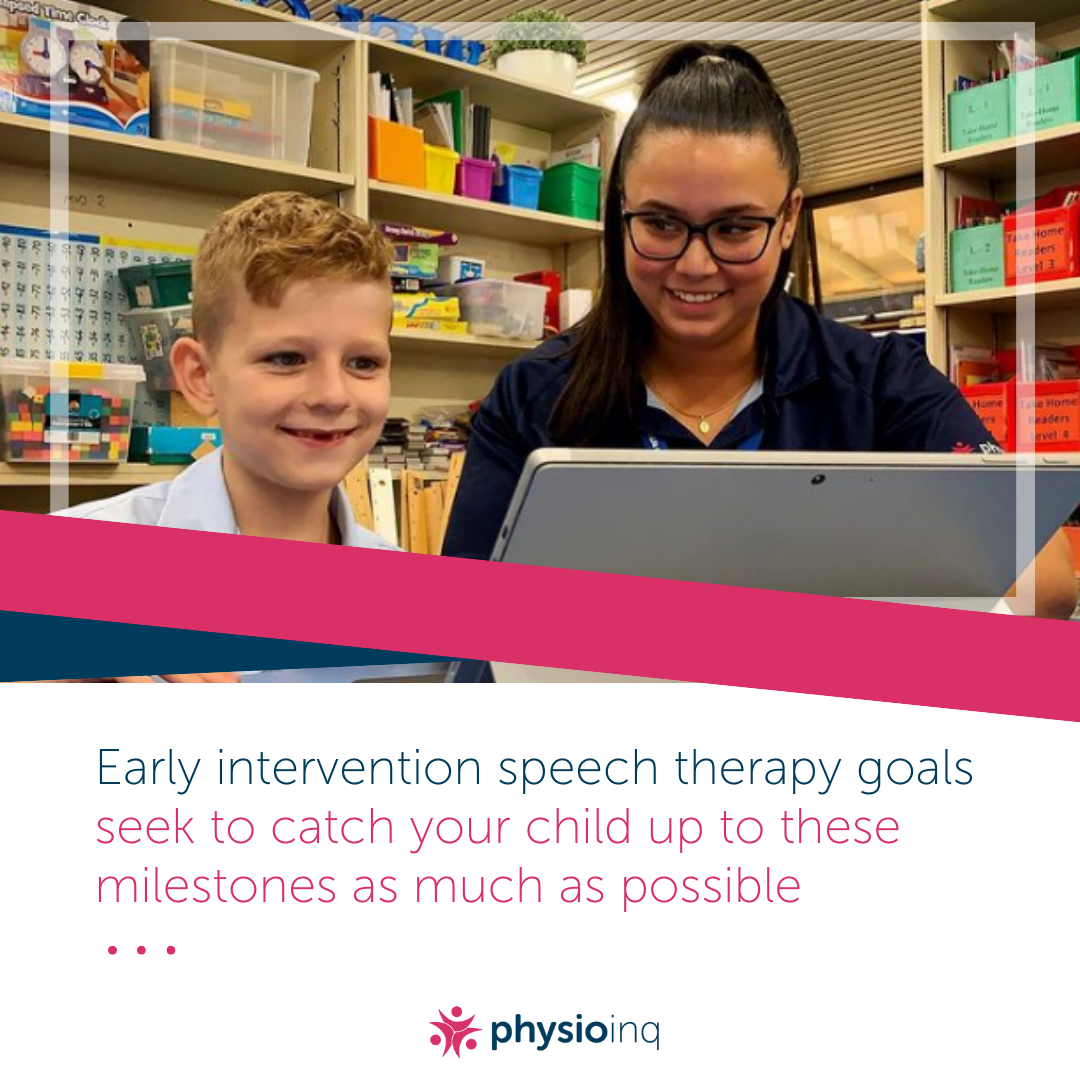
What is the earliest age for speech therapy?
Early intervention is different for each child, depending on their development and needs as well as the needs of the family.
If you are concerned about your child’s development and find yourself asking what is the earliest age for speech therapy, then you are in luck. Speech therapy can begin as early as just after birth in some instances.
Most early intervention speech therapy occurs within the first 0-3 years. For children who were not born with specific health conditions that may lead to developmental delays, it is common for early intervention to begin at 12-18 months.
Though early intervention speech therapy is most commonly provided for children ages 0-3 years, in some cases it may be available to children up to 5 years old.
At any age, if you are concerned with your child’s development, an assessment with a speech pathologist can help you see if there are any delays in your child’s development and provide exercises to get them back on track. They can set appropriate early intervention speech therapy goals for your child to meet.
Neuroplasticity is a “term that refers to the brain’s ability to modify, change and adapt both structure and function throughout life and in response to experience.” It suggests that the brain is “plastic” or moldable, and is able to be changed by stimulation and learning experiences.
While the brain remains plastic throughout all of life, it is most plastic or moldable in the first three years of life. Early intervention services capitalise on your child’s brain’s ability to grow and change most effectively throughout those first three years of life.
What are the benefits of early intervention speech therapy?
There are many benefits of early intervention speech therapy.
A 2008 study suggested that 70-80% of late-talking toddlers will outgrow a language delay if it is an expressive delay only, which means that a significant proportion (20-30%) will not catch up to their peers.
A second study conducted in 2009 linked early language delays to later difficulties reading and writing in school.
Early intervention speech therapy can only benefit your child, even if their delays are modest. Not only will your child gain skills and make progress in their development, but you and your family will have support and guidance.
Benefits of early intervention speech therapy include:
- Brain development
Children develop the majority of their speech and language skills between 0-3 years old. Developing brains are heavily influenced by and most open to learning during this time. Early intervention speech therapy takes advantage of this period of brain development.
- Treatment
While it is impossible to predict any child’s path of development, children who are provided with early intervention can often catch up to their peers before starting school. Children with articulation delays can be assessed and provided with treatment for speech sound disorders
- Communication skills
Communication skills are essential for play and daily routines with your child. Early intervention speech therapy helps children become more effective communicators which decreases frustration and negative behaviours.
- Nonverbal strategies
Nonverbal children can develop strategic means of communication to reduce frustration. While working on long-term goals for nonverbal children, early intervention can help them to develop compensatory strategies in the meantime, such as using pictures or signs to communicate.
- Parental support
Parents and caregivers are a crucial part of early intervention, as they demonstrate the language structure their children are aiming to develop on a daily basis. With early intervention speech therapy, parents are given the tools needed to help facilitate speech and language development at home. They can be taught strategies to use during play, mealtimes, bath times, and reading, as well as specific cueing or feedback strategies for particularly difficult speech sounds.
How can I get early intervention services for my child?
Early intervention services are wide-ranging and may include:
- Psychological services
- Home visits
- Medical, nursing, or nutrition services
- Hearing (audiology) or vision services
- Social work services
- Transportation
- Assistive technology
For a child experiencing developmental delays who need access to speech and language therapy, the first step is to meet with a GP. They may refer you to an NDIS representative called an early childhood partner.
You can also call the National Disability Insurance Agency (NDIA) on 1800 800 110. The NDIA can give you contact details for local early childhood partners, or they might organise for one to call you.
You will meet with the early childhood partner to talk about your child’s and family’s needs and goals. Your early childhood partner may:
- Provide information on mainstream support and services available
- Connect you with community health services or peer support groups in your neighbourhood
- Provide early intervention support
- Help you request access to the NDIS if your child is eligible
If eligible, your child’s early intervention speech pathology services may be covered using your child’s NDIS package under Improved Daily Living Skills (Therapy Supports, Assistive Technology or Home Modifications).
When first meeting with a speech-language pathologist, they will evaluate your child’s skills to see if your child and family are eligible for services. If your child is eligible for services, a more in-depth assessment will be completed. An individualised plan will be constructed that includes goals, services and support for both your child and your family.
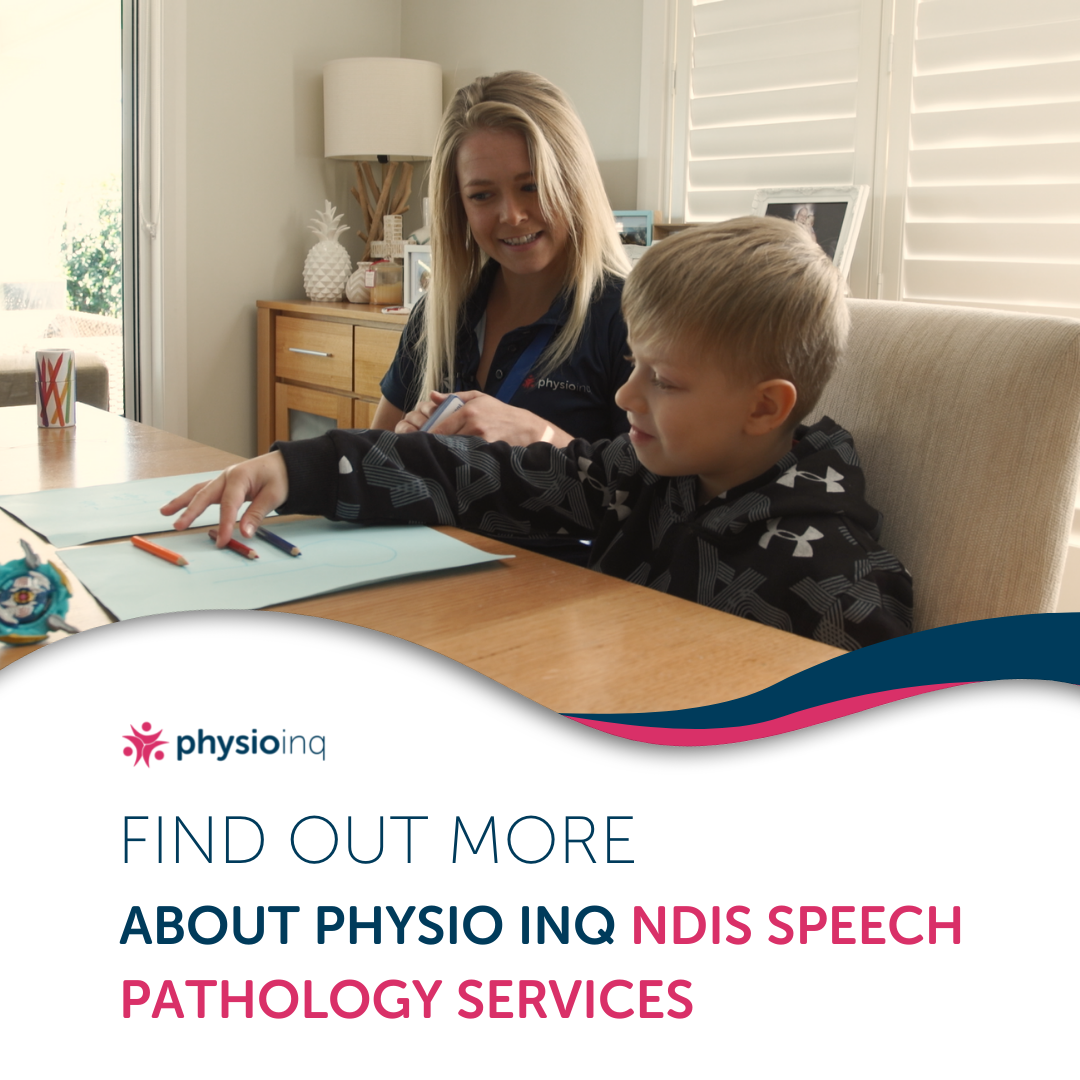
What are some speech pathology early intervention activities?
Early intervention speech therapy may take place in a classroom, small group or one-on-one in a facility or at home, depending on your child’s needs.
Therapy exercises and activities vary based on your child’s age and needs, but a speech-language pathologist may:
- Encourage communication through talking and playing, using books, pictures, and other visual guides as part of language intervention.
- Model correct sounds and syllables through play to teach your child how to make certain sounds
- Provide exercises and homework for both you and your child to practice at home
As a parent or caregiver, some easy methods to ensure you’re doing at home include:
- Talk to your child about what you are doing, where you are going and who and what you will see
- Count out what you see
- Point out colours and shapes
- Use gestures like waving and pointing
- Read to your child
- Repeat what your child says and add on further phrases
- Ask questions that include a choice
- Sing simple songs and nursery rhymes
If you’re concerned about your child’s development and seek further support from a speech-language pathologist, we’re happy to schedule your appointment for an initial consultation at Physio Inq.
From there, we’ll assess any issues and create a plan moving forward. Physio Inq is an NDIS provider and provides both in home and online speech pathology services, so we can provide you with a comprehensive plan to meet your child and your family's needs.
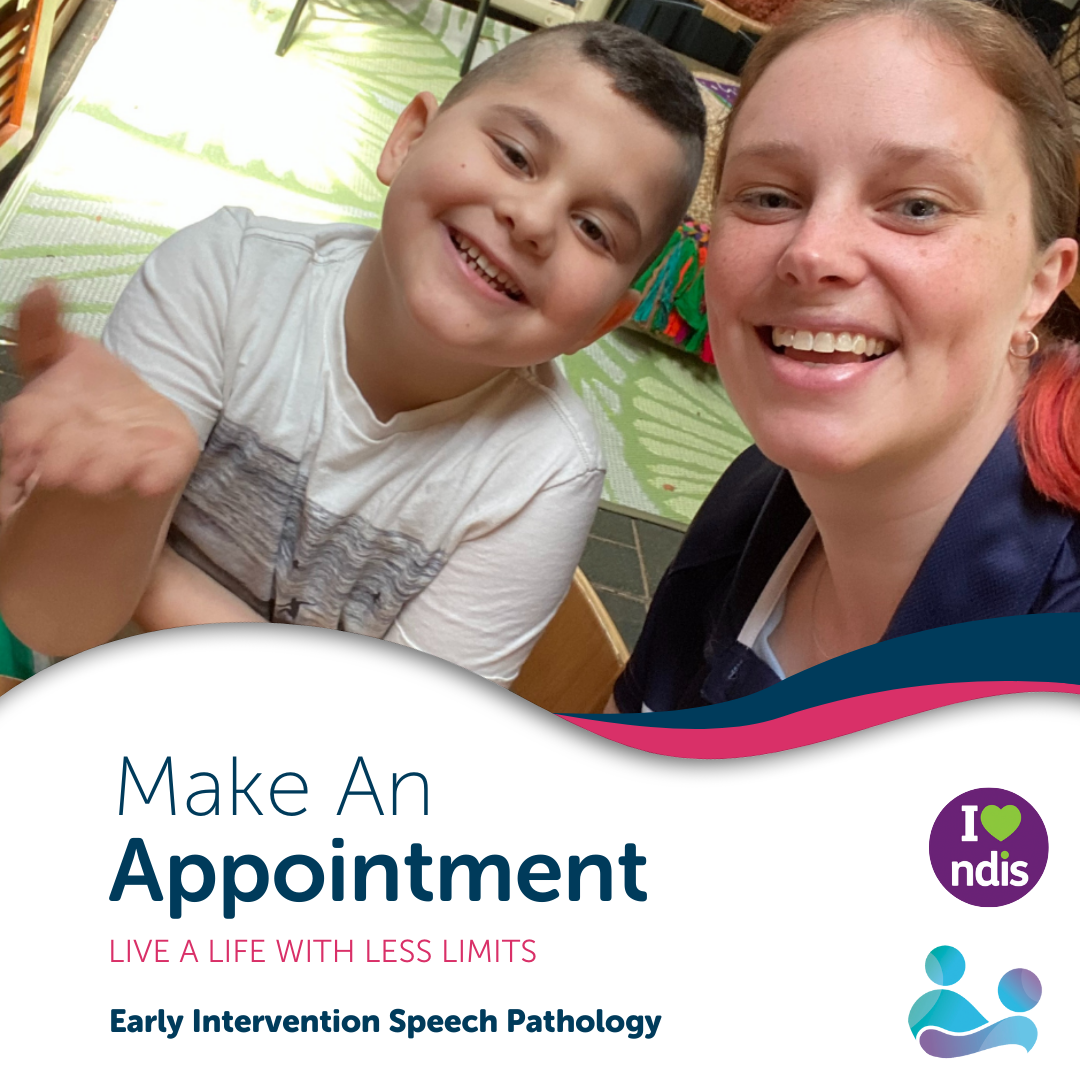
Date Published: Thursday, July 28, 2022
Locate a Speech Pathology
Service Near me
Get the experience & convinence you deserve to support your or a loved one's allied health needs.
Our Speech Pathology team are currently serving & taking appointments in the following states and regions in Australia:
Need to get into direct contact with ur Client Services team? We're all ears. Call our team directly on 1300 731 733










